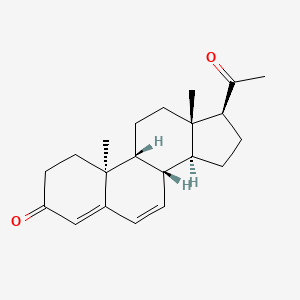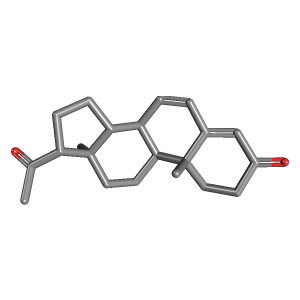Dydrogesterone Information
Click here to view all Dydrogesterone productsThe information, including but not limited to, text, graphics, images and other material contained on this website are for informational purposes only. No material on this site is intended to be a substitute for the consultation, diagnosis, and/or medical treatment of a qualified physician or healthcare provider.


Dydrogesterone is a synthetic hormone that is similar to the naturally occurring hormone progesterone. It is used in the treatment of various gynecological conditions, including menstrual disorders, endometriosis, infertility, and threatened miscarriage.
Dydrogesterone works by binding to progesterone receptors in the body, which are found in the uterus, breasts, and brain. By binding to these receptors, dydrogesterone mimics the effects of progesterone and helps regulate the menstrual cycle, support pregnancy, and maintain the lining of the uterus.
In cases of endometriosis, dydrogesterone helps to reduce the growth of abnormal tissue outside the uterus. It also has anti-inflammatory properties that can alleviate symptoms associated with endometriosis, such as pelvic pain.
Dydrogesterone is considered a safe and well-tolerated medication, with minimal side effects compared to other progestogens. However, it should only be used under the guidance of a healthcare professional and is not suitable for everyone.
Synonyms of Dydrogesterone
- dydrogesterone
- 152-62-5
- Isopregnenone
- Hydrogesterone
- Duphaston
- Hydrogestrone
- Gynorest
- Gestatron
- Diphaston
- Dufaston
- 10alpha-Isopregnenone
- Duvaron
- Prodel
- Retrone
- Terolut
- Retro-6-dehydroprogesterone
- Didrogesterone [DCIT]
- Didrogesterone
- Dydrogesteronum
- delta(6)-Retroprogesterone
- 6-Dehydro-retro-progesterone
- Dydrogesteronum [INN-Latin]
- Dydrogesterona [INN-Spanish]
- delta(sup 6)-Retroprogesterone
- Dydrogesterona
- Dehydrogesterone
- 9beta,10alpha-Pregna-4,6-diene-3,20-dione
- didrogesterona
- Retroprogesterone, 6-dehydro-
- (8S,9R,10S,13S,14S,17S)-17-acetyl-10,13-dimethyl-1,2,8,9,11,12,14,15,16,17-decahydrocyclopenta[a]phenanthren-3-one
- Duphaston (TN)
- 6-Dehydro-9beta,10alpha-progesterone
- Gynorest (TN)
- CCRIS 9069
- HSDB 3321
- 6-Dehydroretroprogesterone
- EINECS 205-806-8
- 9-beta,10alpha-Pregna-4,6-diene-3,20-dione
- NSC 92336
- NSC-92336
- Dydrogesterone [USAN:INN:BAN:JAN]
- (9-beta,10-alpha)-Pregna-4,6-diene-3,20-dione
- Pregna-4,6-diene-3,20-dione, (9beta,10alpha)-
- UNII-90I02KLE8K
- 6-Dehydro-9 beta-10 alpha-progesterone
- MLS002153947
- 90I02KLE8K
- DTXSID1022974
- CHEBI:31527
- (9beta,10alpha)-pregna-4,6-diene-3,20-dione
- 9-beta,10-alpha-Pregna-4,6-diene-3,20-dione
- Dydrogesterone [USAN:USP:INN:BAN:JAN]
- 6-Dehydro-9.beta.,10.alpha.-progesterone
- DTXCID702974
- Pregna-4,6-diene-3,20-dione, (9-beta,10-alpha)-
- CAS-152-62-5
- MLS002695106
- NSC92336
- NCGC00016413-01
- 6 Dehydro 9 beta 10 alpha progesterone
- DELTA6-Retroprogesterone
- Prestwick0_000671
- Prestwick1_000671
- Prestwick2_000671
- Prestwick3_000671
- D0F1UL
- DYDROGESTERONE [MI]
- Pregna-4,6-diene-3,20-dione, (9b,10a)-
- .DELTA.6-Retroprogesterone
- DYDROGESTERONE [INN]
- DYDROGESTERONE [JAN]
- SCHEMBL37703
- BSPBio_000761
- DYDROGESTERONE [HSDB]
- DYDROGESTERONE [USAN]
- Solvay Brand of Dydrogesterone
- SPBio_002682
- DYDROGESTERONE [MART.]
- BPBio1_000839
- GTPL2878
- DYDROGESTERONE [USP-RS]
- DYDROGESTERONE [WHO-DD]
- CHEMBL1200853
- HY-B0257A
- 9.beta.,6-diene-3,20-dione
- Dydrogesterone (JP15/USP/INN)
- Dydrogesterone (JP17/USP/INN)
- HMS1570G03
- HMS2097G03
- HMS2230C10
- HMS3714G03
- 9-.beta.,6-diene-3,20-dione
- AMY23414
- BCP12878
- DYDROGESTERONE [ORANGE BOOK]
- Tox21_110429
- DYDROGESTERONE [EP MONOGRAPH]
- s4097
- Dydrogesterone [USAN:BAN:INN:JAN]
- DYDROGESTERONE [USP MONOGRAPH]
- AKOS015895532
- Tox21_110429_1
- CCG-220671
- DB00378
- GS-6735
- 10alpha-pregna-4,6-diene-3,20-dione
- NCGC00179445-01
- NCGC00179445-03
- NCGC00179445-04
- SMR001233286
- LS-118418
- AB00513884
- (9?,10?)-Pregna-4,6-diene-3,20-dione
- D01217
- H10151
- Pregna-4,20-dione, (9.beta.,10.alpha.)-
- AB00513884_04
- EN300-19767791
- SR-01000841256
- 9.beta.,10.alpha.-Pregna-4,6-diene-3,20-dione
- Q4161380
- SR-01000841256-2
- W-108050
- 9-.beta.,10.alpha.-Pregna-4,6-diene-3,20-dione
- 9beta,10alpha-Pregna-4,6-diene-3,20-dione (8CI)
- BRD-K68620903-001-03-1
- BRD-K68620903-001-11-4
- Pregna-4,6-diene-3,20-dione, (9-beta,10-alpha)-(9CI)
- PREGNA-4,6-DIENE-3,20-DIONE, (9.BETA.,10.ALPHA.)
- (1R,2S,10S,11S,14S,15S)-14-acetyl-2,15-dimethyltetracyclo[8.7.0.0^{2,7}.0^{11,15}]heptadeca-6,8-dien-5-one
- (1S,3aS,3bS,9aS,9bR,11aS)-1-acetyl-9a,11a-dimethyl-1H,2H,3H,3aH,3bH,7H,8H,9H,9aH,9bH,10H,11H,11aH-cyclopenta[a]phenanthren-7-one
- (8S,9R,10S,13S,14S,17S)-17-acetyl-10,13-dimethyl-8,9,10,11,12,13,14,15,16,17-decahydro-1H-cyclopenta[a]phenanthren-3(2H)-one

